17 Must-See Places in Norway According to My Experience

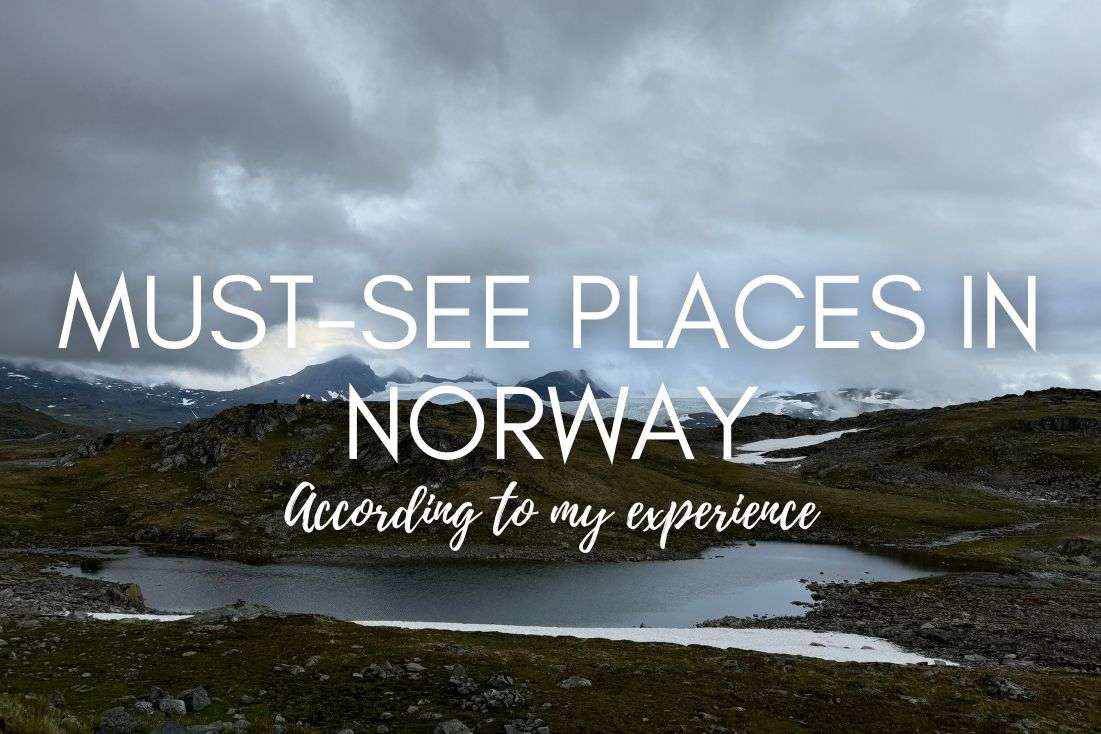
If you’re looking for the must-see places in Norway, congratulations—you’ve found all you’ll need to know in this article! While we’ve all heard about the western fjords (I mean, they are iconic), Norway has way more up its sleeve than scenic water-filled cracks in the earth. And I’m about to prove it.
Recently, I spent a month in this wondrous land to determine the best places to visit in Norway versus the not-as-good things to see. This is my 17-point round-up of the most worthwhile spots, complete with a map, travel tips, and answers to FAQs. What you do in these places is up to you; just as long as you see them with your own eyes on your own bucket-list trip!
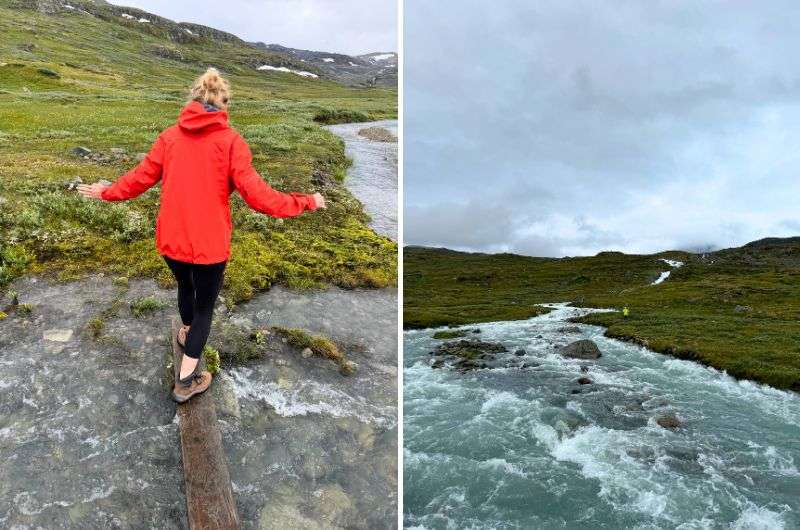
Norway is full of adventures
The 17 best places to visit in Norway
- Nærøyfjord and Aurlandsfjord (Flåm)—the prettiest fjords
- Lysefjord—the best cliff hikes
- Folgefonna National Park—trek across a glacier
- Lofoten Islands—best for the northern lights
- Svalbard—WAY beyond the Arctic Circle
- Jostedalsbreen National Park—the biggest glacier on the continent
- Rondane National Park—the highest peaks
- Hardangerfjord and Hardangervidda National Park—for Trolltunga
- Jotunheimen National Park—one of the most popular national parks
- Geirangerfjord—a UNESCO World Heritage Site
- Atlantic Ocean Road—where car commercials are filmed
- Trollveggen—the tallest vertical cliff in Europe
- Bergen—a diamond of a port city on the west coast
- Stavanger—Norway’s trendy oil hub
- Ålesund—an Art Nouveau toy-town
- North Cape (Nordkapp)—best for the midnight sun
- Oslo—the capital that deserves more love
Sometimes, all you need to do is take the first step... I've filtered out the best hotels in Norway for you
Save it for yourself to come back to later, or share with your friends on social media!
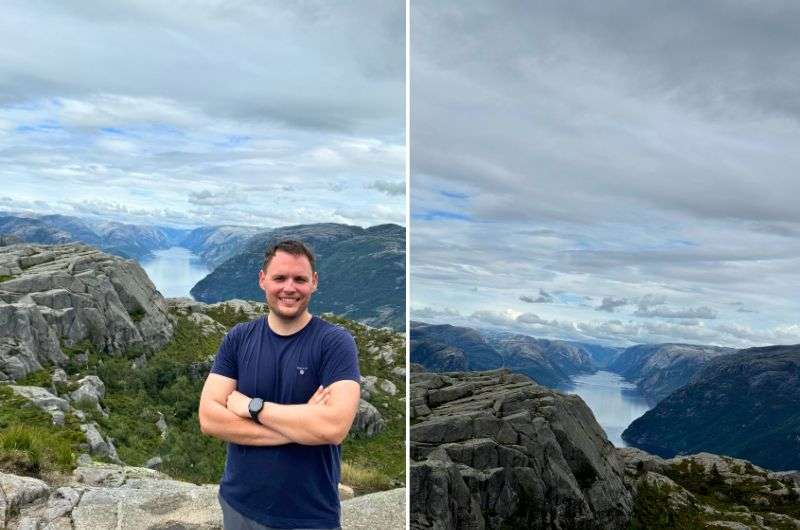
A spectacular view of me and Pulpit Rock
Need more help planning a Norwegian road trip? Check out my 7-day Norway starter itinerary:

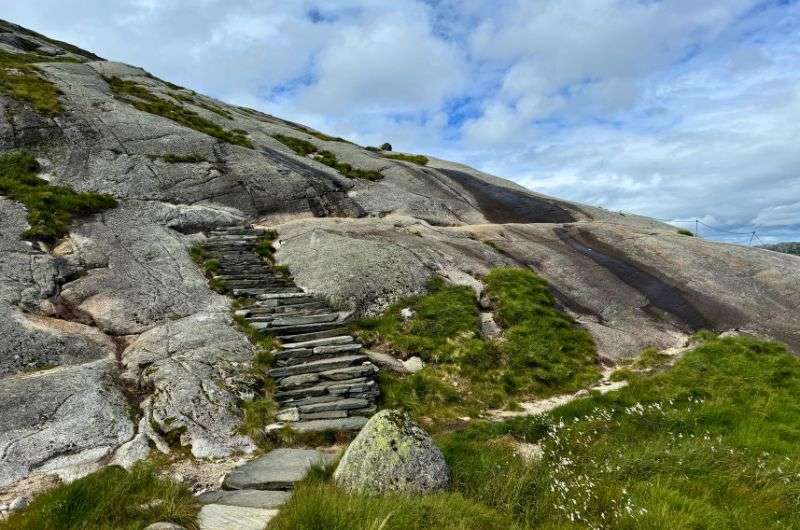
Kjerag hike terrain
The best places to visit in Norway: my travel tips
- The best time to visit Norway is between June and August. Let’s get this straight: it’s never hot in Norway, but in summer, you get the long days and optimum weather for outdoor activities around the fjords and in the national parks. Just be prepared for everyone else to have the same idea as you.
- Pack as if you were an onion. All year round in Norway, from north to south, wearing layers is key.
- Gear up for the countryside. "Gear” means sturdy, waterproof hiking boots, a rain jacket, and a reliable backpack. Bonus points for bringing trekking poles and a reusable water bottle. Norway’s tap water is fresher than most bottled brands—you can even drink straight from steep mountain streams!
- As a rule of thumb, the best time to start a hike is as early in the morning as you can manage.
- Good to know when driving in Norway: The average speed is around 70 km/h (43 mi/h), and people stick to it strictly. Norwegian drivers can be rude, rarely yielding or making room, and they drive some hella flashy cars. Parking can be limited and expensive, but you must use official parking lots or risk being fined.
- Ferries are your friends. They’re efficient, frequent, and surprisingly chill. Register your car on ferrypay.no and enjoy the ride without any hassle.
- If you don’t plan to drive in Norway, these are the easiest non-urban places to visit on some kind of organized tour: Flåm, Lysefjord, Folgefonna glacier, Hardangerfjord, Jotunheimen National Park, Geirangerfjord, and North Cape.
- In general, hotels aren’t amazing. Lower your expectations, especially when it comes to restaurant service. The less said about that, the better.
- BUT fine dining is something that Norway does surprisingly well. Trust me—if you can afford it, treat yourself!
Map of the best places Norway has to offer
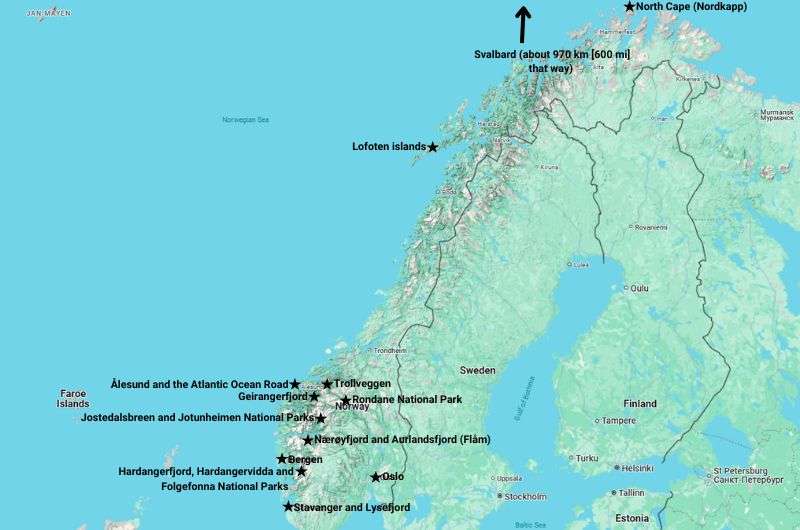
Map of the best places to see in Norway
1. Nærøyfjord and Aurlandsfjord (Flåm)—the prettiest fjords
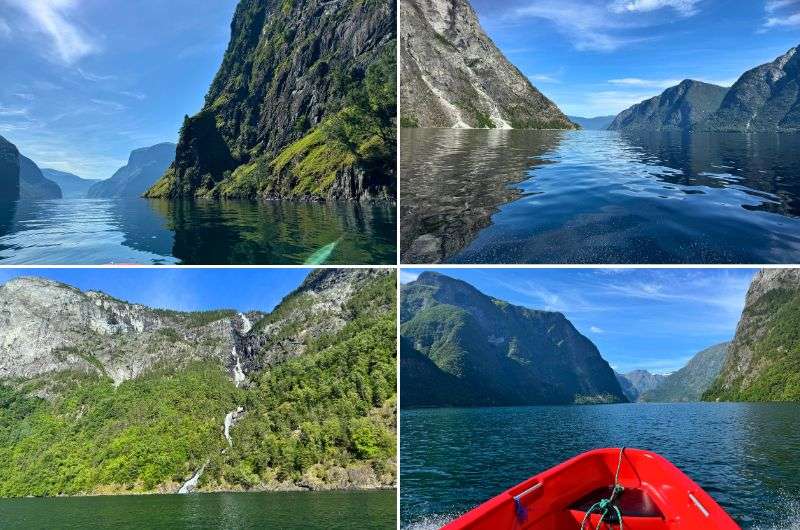
Nærøyfjord
- Best things to do: Rent a motorboat, ride the Flåm Railway, visit “Viking Valley”
- Hotel tip: Vangsgaarden Gjestgiveri—probably the best accommodation I’ve ever had in Norway.
- Further reading: The top Norwegian fjords
Nærøyfjord is a branch of Sognefjord, which is the longest (205 km [127 mi]) and deepest (1,308 m [4,291 ft]) fjord in Norway. But because I like ranking stuff, I need to say that Nærøyfjord is my very favorite Norwegian fjord. And I’m not alone; the National Geographic Society once rated Nærøyfjord as the world’s best natural heritage site!
Why? Well, it’s just that damn pretty. When I was there, I simply couldn’t take my eyes off the mirror-like water, the lush green cliffsides, and the dreamy, dramatic horizons. Gudvangen, the village nestled among the cliffs, is honestly one of the most picturesque places I’ve ever seen.
Fun fact: Nærøyfjord is so beautiful that it inspired the wintry kingdom in Frozen, that Disney movie you’ll certainly be familiar with if you have any young kids.
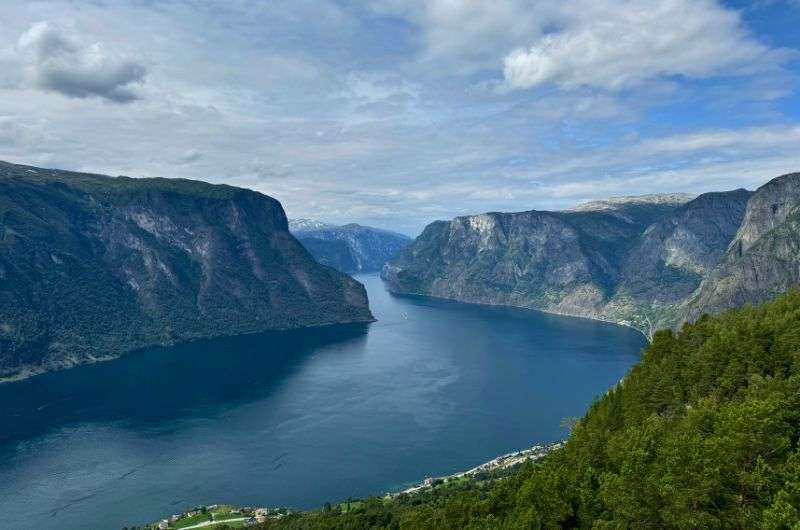
Aurlandsfjord
Meanwhile, Aurlandsfjord adjoins Nærøyfjord in a sort of wishbone formation. For some reason, the UNESCO big shots thought only Nærøyfjord was deserving of World Heritage status, but in my opinion, Aurlandsfjord is just as breathtaking.
And while Naeroyfjord has Gudvangen, Flåm is the village at the tip of Aurlandsfjord that everyone and their mother seem to flock to. Honestly—Flåm is one of the pit stops on the “Norway in a nutshell” organized tour. So, y’know, it must be good!
(Psst—I wrote a whole article on the best, most fun things to do in Flåm...)
Tip: Stay in Aurland, the next village along the bank of the fjord from Flåm. It’s cheaper, and quieter, and you won’t have any massive, ugly cruise ships docking right in front of you.
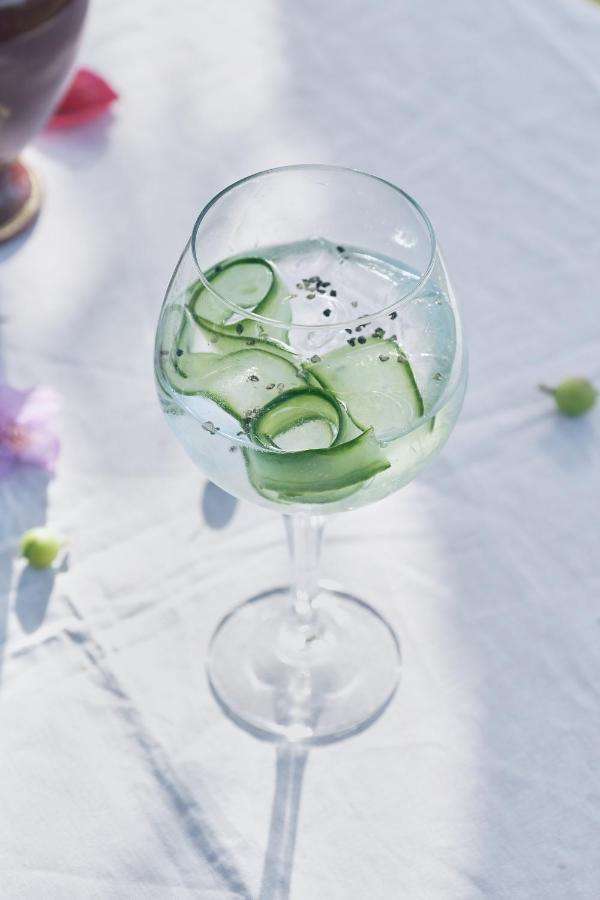
2. Lysefjord—the best cliff hikes
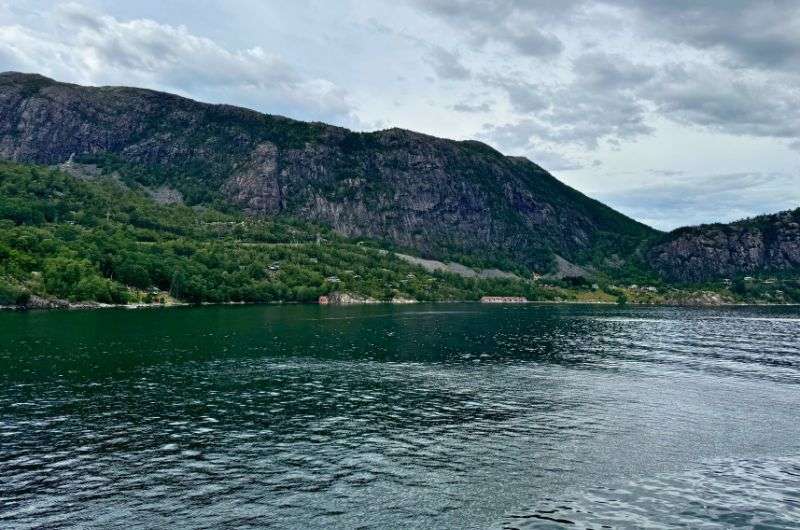
Lysefjord
- Best things to do: Hike Pulpit Rock, hike Kjerag, go on a cruise
- Further reading: My guide to hiking Pulpit Rock (Preikestolen)
Sticking with the fjords (they are the country’s biggest tourist attraction, after all), I couldn’t put Lysefjord second in my ranking of the must-see places in Norway.
In all its rocky scenery, raw wilderness, and rugged beauty, I didn’t expect Lysefjord to remind me of Vancouver Island, of all places. And yet, it’s located just an hour’s drive from the city of Stavanger, making this not just one of the best places to visit in Norway, but one of the most accessible, too
Moreover, Lysefjord is a popular choice of Norwegian fjord to visit because it’s the setting for 2 of Norway’s most iconic hikes. I’ve done both of them and let me just put it this way: if Pulpit Rock were a family-friendly show, Kjerag would be the late-night horror.
Read all about my adrenaline-pumping experience hiking Kjerag/Kjeragbolten:

3. Folgefonna National Park—trek across a glacier
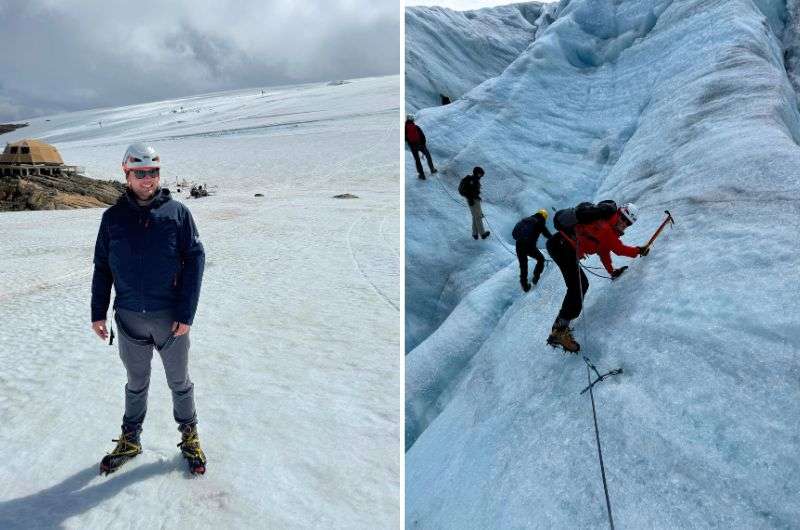
Let’s climb some glaciers!
- Best things to do: Hike Folgefonna glacier, go glacier kayaking
- Further reading: My bucket list of activities in Norway
There are several national parks on this list of must-see places in Norway, but for me, this one’s the best. Folgefonna isn’t just another pretty patch of Norway; it’s an icy, jaw-dropping masterpiece of glaciers, waterfalls, and alpine drama. It might not have the crowds of Jotunheimen or the fame of Geirangerfjord (stay tuned), but it’s 100% unforgettable.
Its namesake is the Folgefonna Glacier. With an approximate surface area of 207 km² (80 mi²), it’s the third largest glacier in mainland Norway, and it sprawls across the landscape like a frozen tidal wave. If glaciers could win beauty contests, I feel this one would sweep every category.
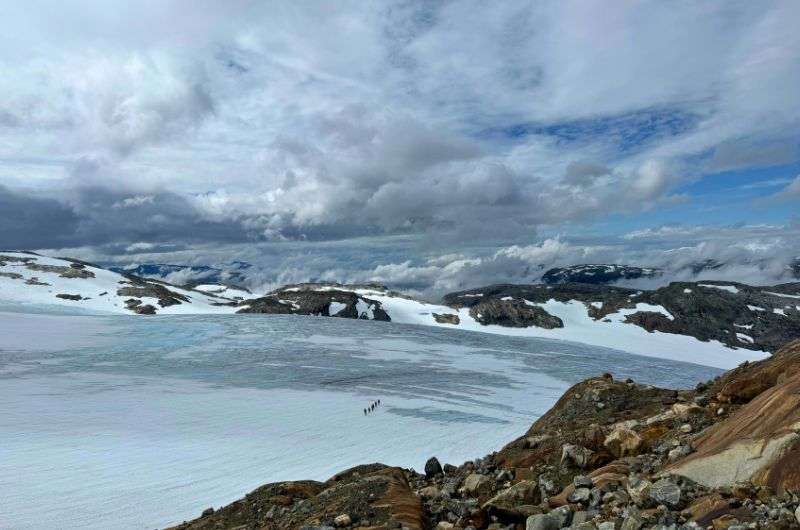
Blue ice magic
The park’s real claim to fame is its blue-ice magic. I can attest that hiking across the neon glacier with crampons strapped to your boots is utterly surreal. You’ll hear the ice creaking beneath you and look deep into otherworldly crevasses. It’s a full-body, “is this real life?” experience.
But if ice-trekking isn’t your vibe, don’t worry. Folgefonna offers plenty of normal (but equally epic) hiking trails, as well as opportunities for glacier kayaking. Whatever you choose to get up to here, trust me—your surroundings will be so photogenic, even your camera’s eyes will be watering.
Read my article on the best national parks in Norway for more on why I rate this place so highly!
4. Lofoten islands—best for the northern lights
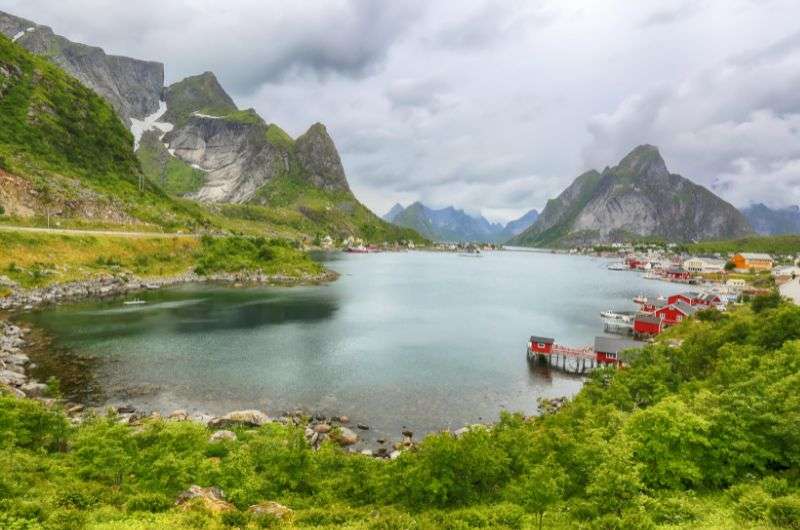
Lofoten islands
- Best things to do: See the northern lights, birdwatch, go fishing
- Further reading: The best time to visit Norway
The Lofoten islands in Northern Norway aren’t just a destination—they’re a mic drop. Jagged peaks stab the sky, colorful villages cling to the coast, and the beaches are so white you’d swear you were in the Caribbean (if not for the very cold sea).
Fun fact: The Lofoten Islands experience one of the largest temperature anomalies in the world. Despite being beyond the Arctic Circle, winters here are surprisingly mild, thanks to the Gulf Stream. I’d say it’s like another little Scotland, 68 degrees north.
The Lofoten mountains are dramatic, and positively everywhere, and they somehow look good in any weather. Naturalists also love it here due to endangered fauna species, and birdwatchers come for mainland Europe's largest seabird colony. And then there are the postcard-perfect fishing villages, with their red cabins on stilts and boats bobbing in the harbors. It’s all quite cute.
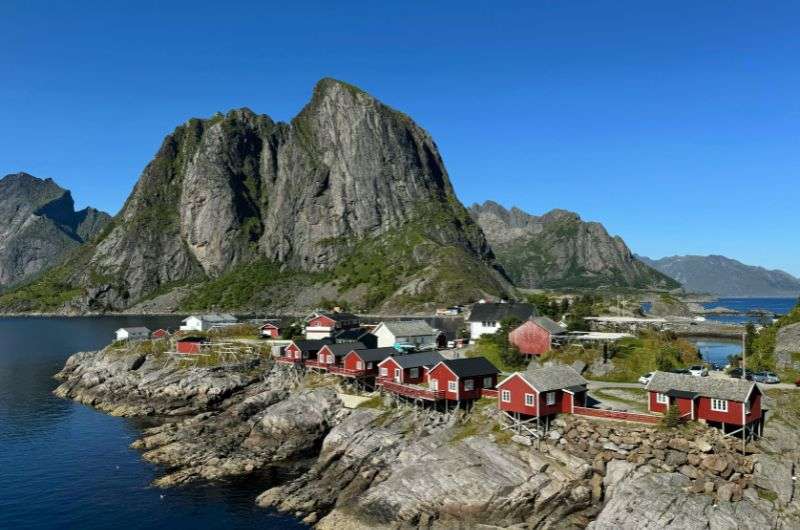
The Lofoten mountains look unreal!
In this part of the world, you can eat cod in two very different ways: so fresh it’s practically still swimming, or as stockfish, after it’s been hung out to dry for half a year on a hjell (wooden rack). Yum...?
And of course, this place is one of the best seats in Norway for a light show. In winter, you've got the dancing northern lights, one of the most spectacular natural wonders; and six months later, the sun just outright refuses to set (the real brat summer).
5. Svalbard—WAY beyond the Arctic Circle
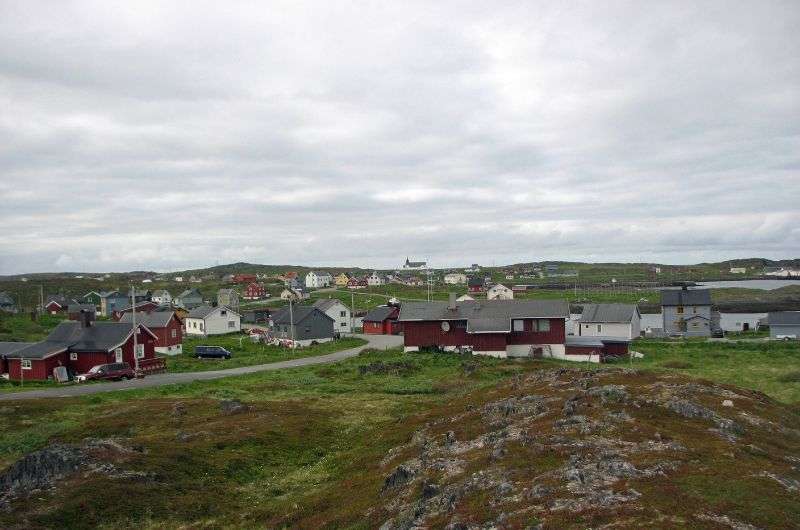
Svalbard
- Best things to do: Go on a glacier cruise, try not to get mauled by a polar bear
- Further reading: The best things to do in Norway
But what if the Lofoten islands aren’t far north enough for you? Weird flex, but okay—try this place for size...
Sitting halfway between mainland Norway and the North Pole, this Arctic archipelago is where all the rules of regular travel seem to go out the window. Here, snowmobiles and dogsleds are the popular forms of transport, and polar bears outnumber people. By law, you need a rifle outside of Longyearbyen, the bustling capital (population: 1,700) of this rugged nugget of land. Welcome to Svalbard!
Landscape-wise, Svalbard is all glaciers, jagged peaks, and tundra that stretches forever. It’s raw, remote (one of the world’s northernmost inhabited places, in fact) and ridiculously photogenic.
The wildlife? Think Arctic foxes, reindeer, and seals chilling out on floating ice sheets. But the real stars of the show are the polar bears. These guys are the unofficial mascots of Svalbard, and while spotting one is a once-in-a-lifetime thrill, just remember that they see you as lunch. Keep your distance.
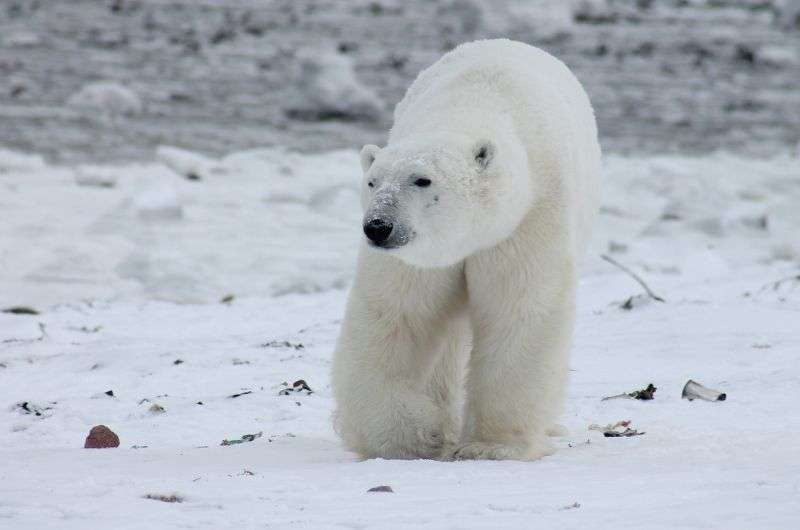
You really can come across these fellas in Svalbard. Beware!
Overall, Svalbard is wild, extreme, and not for the faint of heart. And that’s exactly why it’s one of the best places to visit in Norway!
6. Jostedalsbreen National Park—the biggest glacier on the continent
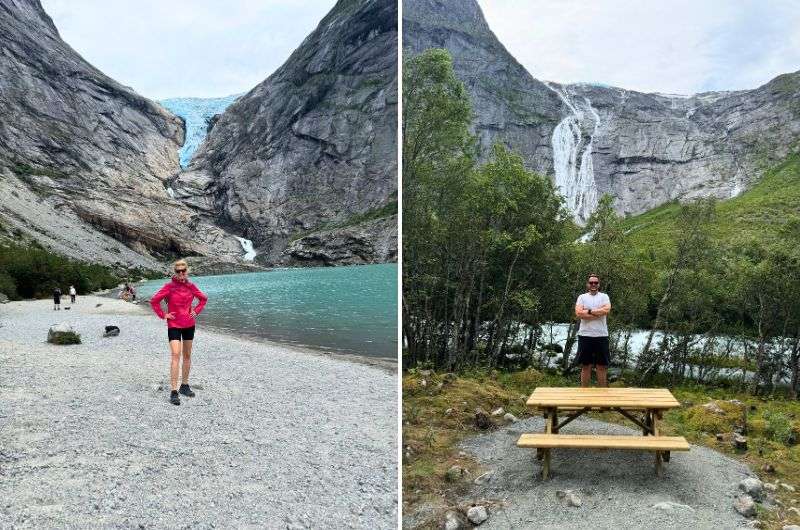
Who can pose better?
- Best things to do: Hike Briksdal glacier, hike Nigardsbreen glacier
- Further reading: The best hikes in Norway
Folgefonna’s got the glaciers, but Jostedalsbreen National Park is the land of glaciers and waterfalls. Here, jagged cliffs and icy rivers spill down into green valleys. This is what I always thought Norway would be like!
The national park’s centerpiece is the Jostedalsbreen glacier itself. Spanning a mind-blowing 487 km² (11 mi²), it’s basically a frozen giant lounging across the landscape. Nigardsbreen, one of the glacier’s arms, is the bit you can actually hike on. Like on Folgefonna, it’s equal parts surreal and nerve-wracking—especially when your guide casually mentions the crevasses below.
As I say, it’s also waterfalls galore here. And if you ask me, the best way to understand just how epic they are is to go on a hike that’ll get you up close to them.
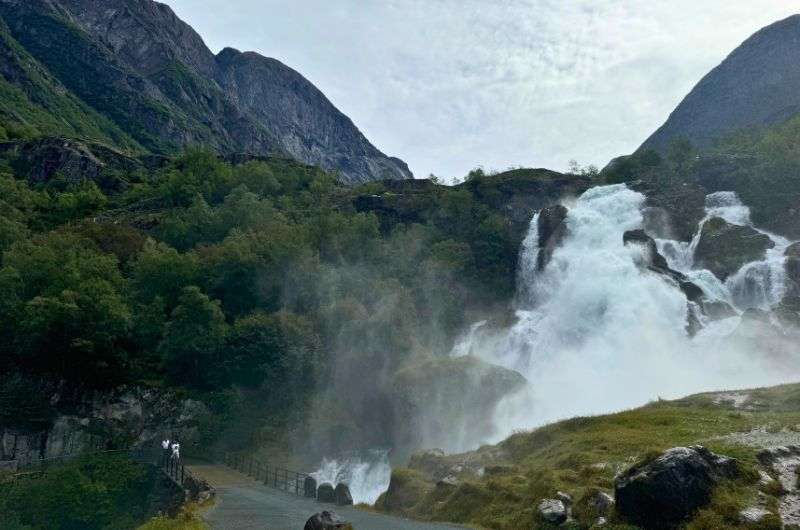
On the Briksdal Glacier hike, you’ll come across some pretty epic sights—like this massive waterfall, for example!
I personally recommend the Briksdal glacier hike. It’s very reminiscent of Glacier National Park in Montana, but with towering cliffs, and the pièce de résistance, extra waterfalls.
Fun fact: Jostedalsbreen is actually the largest glacier in continental Europe (487 km² [188 km²]), which is why I included it in my list of the best 11 natural attractions in Norway:

7. Rondane National Park—the highest peaks
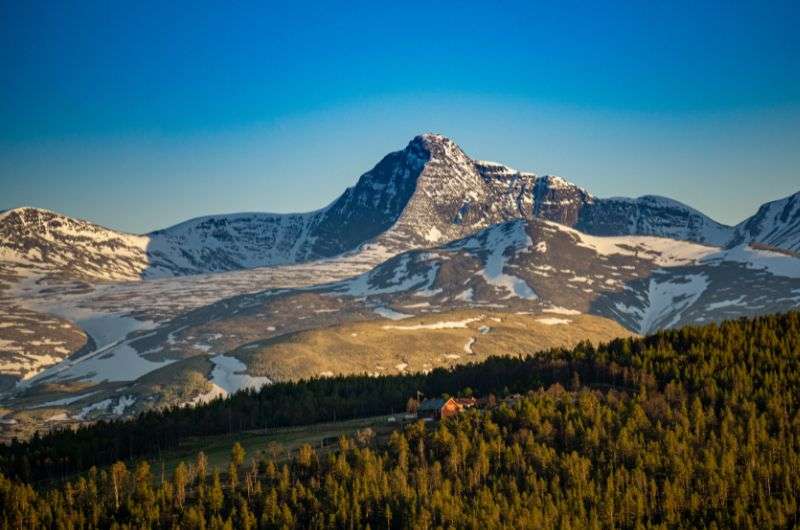
Rondane and its highest peaks
- Best things to do: Hike Rondslottet, spot reindeer
- Further reading: The best national parks in Norway
Get ready for towering peaks, ancient valleys, and an eerie silence that almost makes you wonder whether trolls are lurking just out of sight. This is Norway’s oldest national park (established 1962, which I didn’t find that impressive), and if anywhere on this list is nailing the untouched wilderness vibe, it’s Rondane National Park.
The park is home to ten peaks over 2,000 m (6,562 ft), so naturally, hiking is the main event here. And if you're the sort of hiker who doesn't like meeting other people on their way (read: grumpy bastard), grumble no more, because Rondane’s got you covered! The trails here are really quiet compared to those, say, in Jotunheimen or around Lysefjord.
Fun fact: At 2,178 m (7,146 ft), Rondane’s highest peak is Rondslottet. This is a solid choice of trek if you like amazing panoramas and sweating profusely.
There’s plenty of wildlife, too. Rondane is one of the last places in Europe where you can spot wild reindeer roaming the plateaus. Pro tip: Bring binoculars—they’re majestic, but they also like to keep their distance.
8. Hardangerfjord and Hardangervidda National Park—for Trolltunga
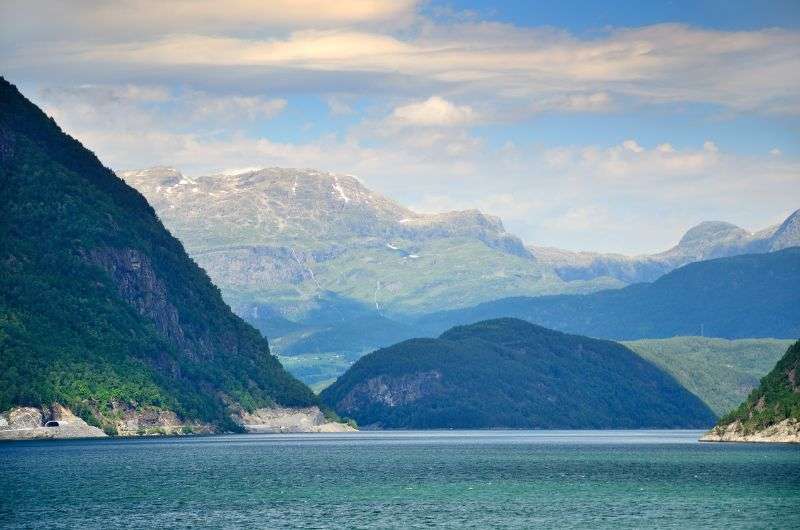
Hardangerfjord
- Best things to do: Hike Trolltunga, hike to Nykkjesøyfossen
- Hotel tip: Trolltunga Hotel
- Further reading: The best Norwegian fjords
Hardangerfjord is the second-longest fjord in Norway and fifth-longest in the whole world. From the west coast, it winds an incredible 179 km (111 mi) to its innermost point, where it meets the village of Odda. This is precisely why it'd place comfortably on any list of the must-see places in Norway. And if you ever book to go on a Norwegian fjord cruise, there’s a good chance this beast will be on the itinerary.
The nearby Hardangervidda National Park is Norway’s high-altitude wilderness playground. It’s the largest national park in the country, but don’t expect noticeable crowds—when I was there, I pretty much felt like I had it all to myself. Think windy plateaus, glacial lakes, and a landscape so vast it makes your problems feel tiny. Just what you want from any vacation, right?
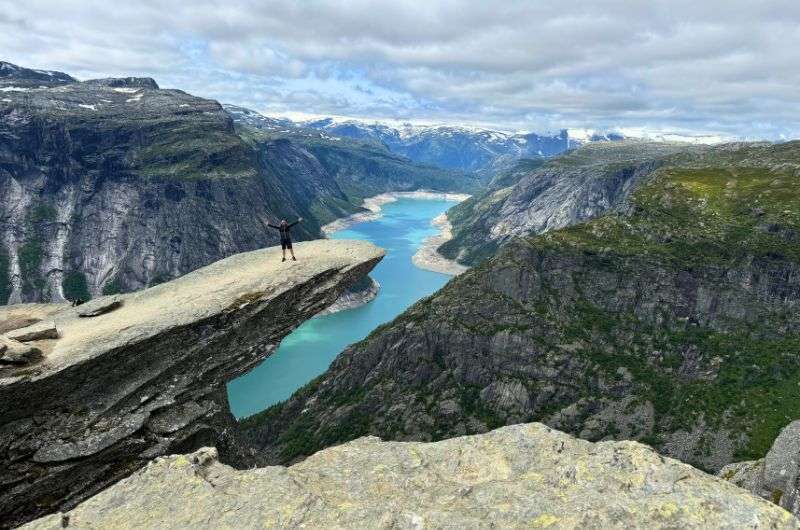
Me on the Trolltunga (Troll’s tongue)
Honestly, hiking here is pure magic. Trails crisscross the park, leading you to deep valleys, waterfalls, and ridges. The terrain is flat-ish (by Norwegian standards), making it perfect for long, soul-cleansing walks. Just read my article on hiking Trolltunga, one of the most famous hikes in Norway, and you’ll understand what I mean:

9. Jotunheimen National Park—one of the most popular national parks
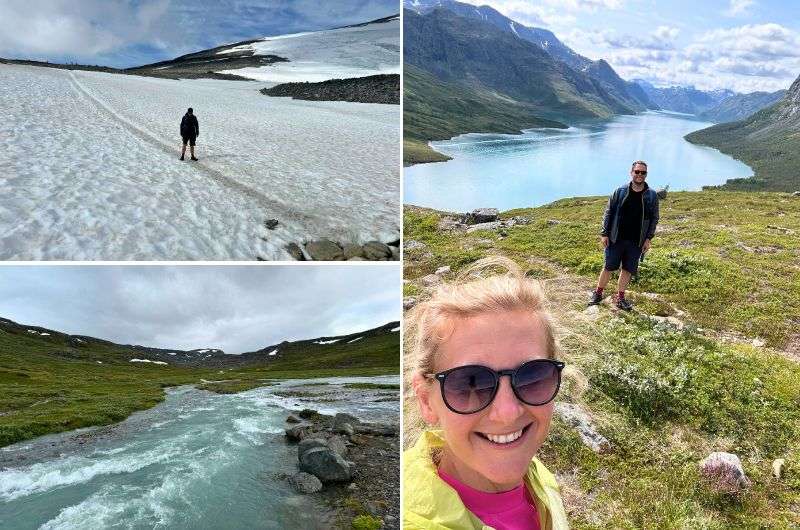
The different sceneries of Jotunheimen National Park
- Best things to do: Hike the Besseggen Ridge, hike Galdhøpiggen
- Further reading: Norway’s top natural attractions
This isn’t just one of Norway’s best national parks—it’s the park other parks wish they could be (hence its many visitors). As a gentle introduction, “Jotunheimen” means “Home of the Giants”, so yeah, the vibes here are huge.
Home to Norway’s and Scandinavia’s very tallest peaks, it’s the perfect place for anyone who likes their hikes steep (me), their lakes icy (me, I guess), and their landscapes looking like something out of Norse mythology (definitely me). This is where Galdhøpiggen is, the highest mountain in northern Europe, which takes about 8 hours to climb.
A trip to Jotunheimen National Park means laying your eyes on thundering waterfalls, monstrous valleys, and icy plains stretching out like frozen deserts. It knows how to deliver jaw-dropping views across the board, but the highlight of my time there was the Besseggen Ridge.
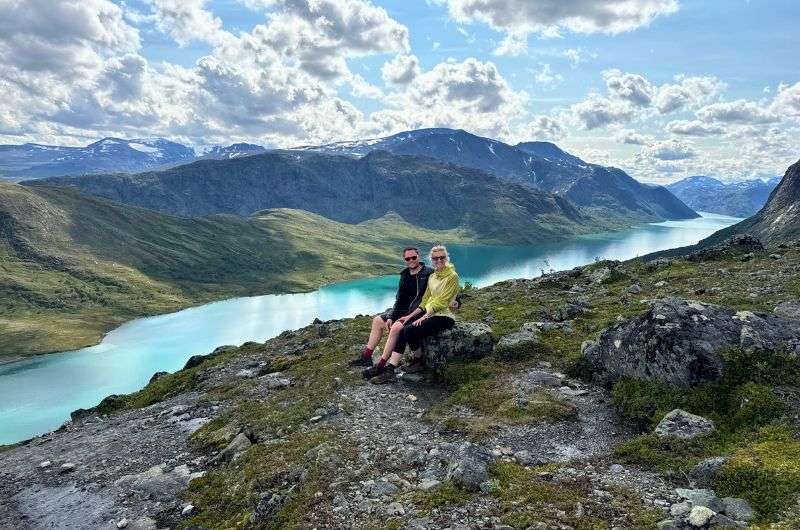
Us, happy on the Besseggen Ridge hike (how could you not smile with this view!)
It’s just so epic, walking along a knife-edge mountain ridge with a turquoise lake on one side and a deep blue one on the other. (I’ll say here that this probably isn’t the best place in Norway for you if you’re scared of heights.) You can read more about my experience hiking the Besseggen Ridge right here:

Above all, this special national park is unforgivingly rugged and absurdly beautiful—the Norse adventure you didn’t know you needed. Just take my advice: plan your Jotunheimen itinerary properly and well in advance, because loads of other people want in on the action, too.
10. Geirangerfjord—a UNESCO World Heritage Site
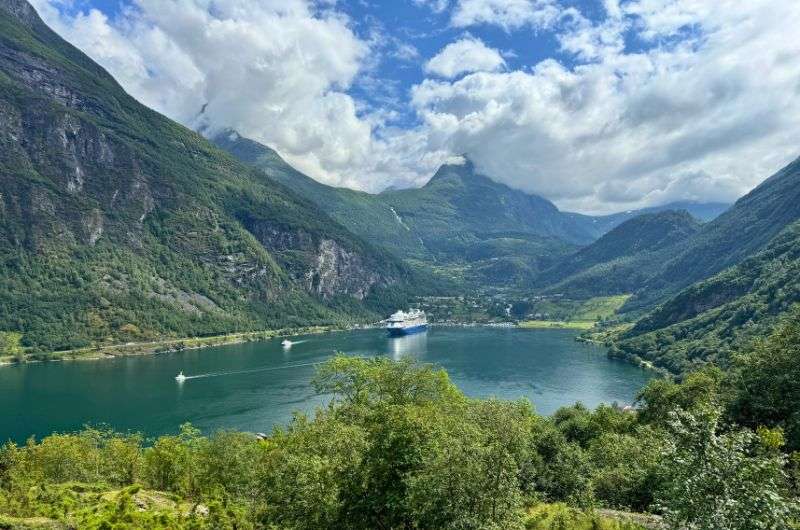
Geirangerfjord
- Best things to do: Hike to Skageflå, go kayaking, visit the Dalsnibba viewpoint
- Further reading: My 14-day Norway itinerary
And speaking of popular places to visit in Norway that don’t need any more smoke blown up their asses (but I’m doing it anyway), say hello to Geirangerfjord!
This is very much the golden child of the Norwegian fjords and the one that Nærøyfjord shares its UNESCO stamp of approval with. Not only is Geirangerfjord the most visited fjord in Norway—it’s said to be one of the most beautiful fjords in the world. I’d loosely agree; I found it unbelievably dramatic.
By “dramatic”, I mean it sort of feels like you’re stepping into a movie set, with sheer cliffs, cascading waterfalls (i.e. the Seven Sisters), and water so clear and perfect, it mirrors the sky. Visiting Geirangerfjord made me feel tiny in the best way, a much-appreciated humbling experience. Ultimately, I could never deny that this is one of the must-see places in Norway.
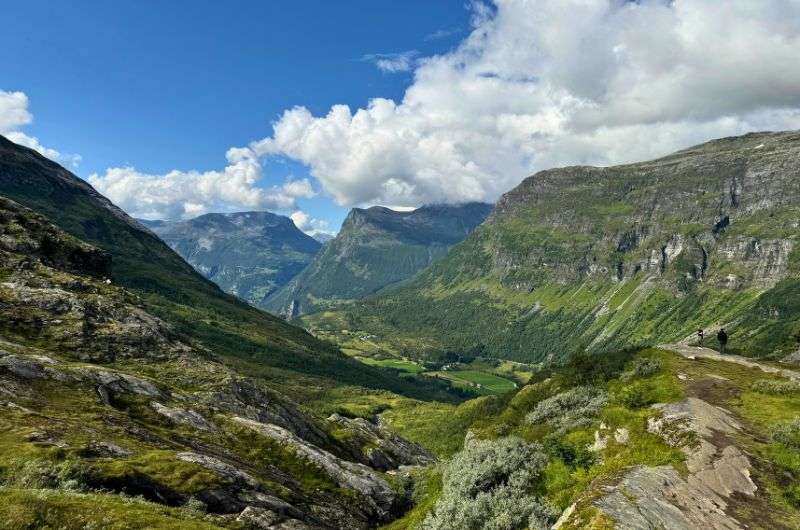
Wow!
Tip: On any day spent around Geirangerfjord, get an early start to avoid the parking chaos. Come 9 am, Geiranger town is like a giant game of Tetris.
Read more about the best views to be had around Geirangerfjord in my article on the best things to do in Norway.
11. Atlantic Ocean Road—where car commercials are filmed
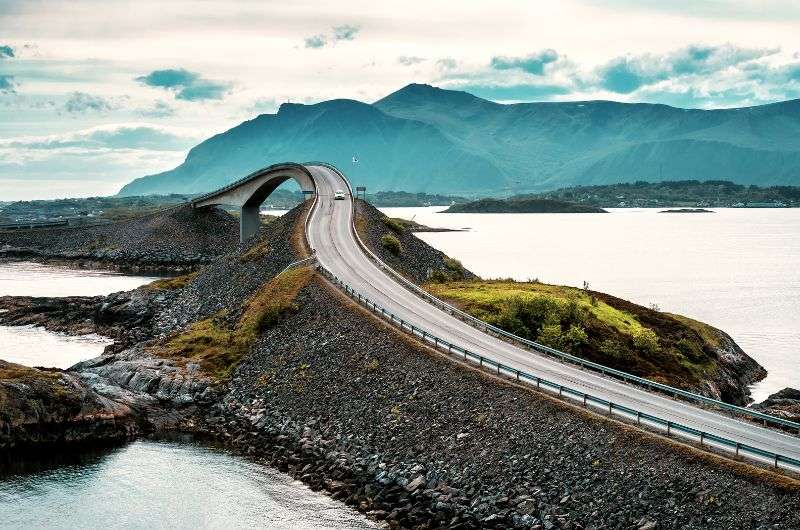
Atlantic Ocean Road, every car’s dream commercial location
- The best thing to do is drive on it (duh)
- Further reading: Things to do in Ålesund
What’s 8.3 km (5.2 mi) long, was once deemed the “Norwegian construction of the century”, and is suggested to be the best road trip in the world. Meet the Atlantic Ocean Road!
This marvel of engineering starts about 130 km (80 mi) northeast of the city of Ålesund and has been wowing drivers since 1989 (yet another thing cooler and younger than I am). It snakes over 7 bridges, connecting tiny islands with gravity-defying curves that look like something out of Mario Kart.
Make no mistake—there’s zero protection on this drive between you and the sea. When the weather’s wild, supposedly, waves crash against the road, making you feel like the star of a very wet action movie. But I lucked out with a calm, sunny day, and was treated to dazzling coastal views that stretched endlessly toward the horizon.
Fun fact: You know those car commercials that are shot on a road against epic, moody sea-and-island scenery? Yep, that’s here.
12. Trollveggen—the tallest vertical cliff in Europe
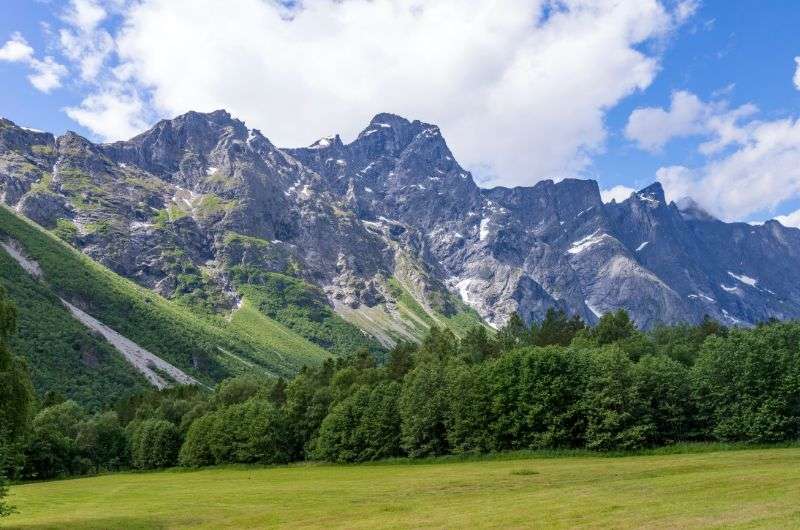
Trollveggen
- Best things to do: See Trollveggen and Trollstigen
- Further reading: My 14-day Norway itinerary
Standing at 1,100 m (3,608 ft), Trollveggen is the tallest vertical cliff in Europe, so obviously, I had to include it on a list of the best places to visit in Norway, despite how intimidating it is.
Fun fact: Legend says the wall is home to trolls frozen in stone, hence its name, which means “Troll wall”. Judging by its size, I’d say they were a pretty frightening bunch.
Trollveggen has always enticed daredevils, from climbers who think ropes are optional to base jumpers who... well, let’s just say they had life insurance. (Base jumping was actually banned here in the 1980s.) But for me—a bit of a wuss—it was all about gazing up at it from its base, wondering how it was even real. You can also get the view from the top if you’re willing to make an ambitious trip on foot.
Tip: If you decide to go and see Trollveggen, make sure you get a look Trollstigen, too. This crazy, winding mountain road is closed at the moment (as of January 2025), but you can still get to its viewpoint. See my article on things to do near Ålesund for more details.
13. Bergen—a diamond of a port city on the west coast
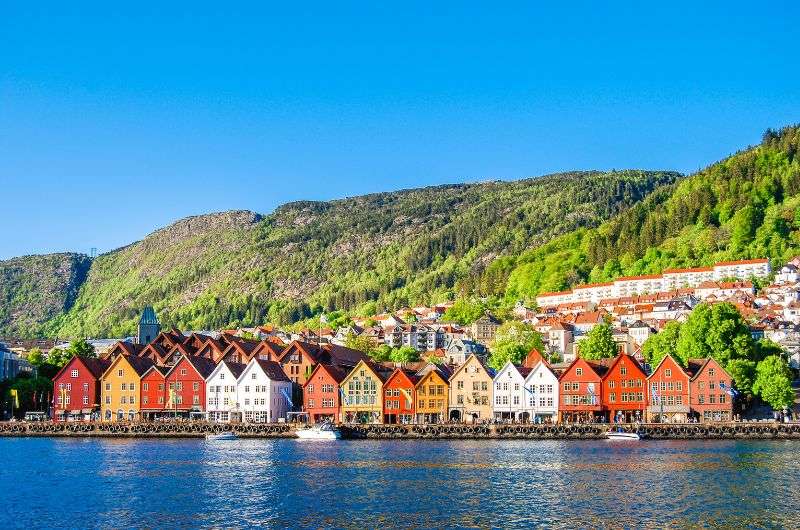
The city of Bergen
- Best things to do: Walk down Bryggen, visit the fish markets, hike Fløyen
Bergen, the country’s second city (population: 292,000), exudes a kind of special atmosphere. It’s a bit like Norway’s answer to Tobermory, but on a much larger scale. This vibrant North Sea hub is surrounded by the Seven Mountains (of which there are actually nine because they can’t make their minds up about which ones count) and yet more sparkling fjords. Predictably beautiful!
Fun fact: Bergen was once Norway’s capital, and honestly, it still kind of feels like it should be. In my opinion, this is the most charming of all the Norwegian cities. Sure, it rains a lot (seriously—it’s the rainiest place in Europe), but that’s just part of the charm. Well, it is so long as you’ve got a waterproof jacket and an umbrella.
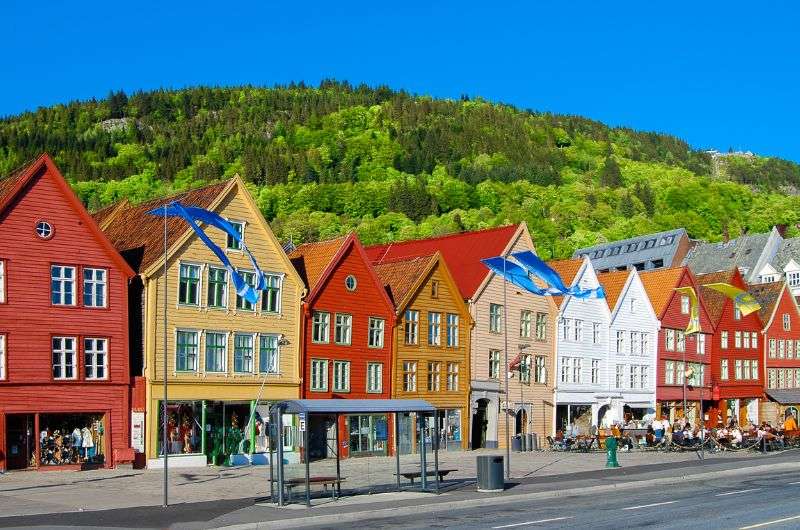
The iconic colorful wooden houses in Bergen
Bryggen is probably the most iconic thing about this city—the UNESCO-stamped row of colorful wooden houses lining the harbor. They’ve been standing since the Hanseatic League was running the show, so walking through them is pretty much a history lesson (something that I, of course, absolutely lapped up).
As you might expect, Bergen’s seafood game is also next-level. I loved wandering around the indoor and outdoor fish markets, just for the fact that I got to see and taste all the good stuff that my own painfully landlocked country fails to provide.
Honestly, take my advice: If you’re planning to fly to Norway, try to land in Bergen and book your trip with a couple of days here.
14. Stavanger—Norway’s trendy oil hub
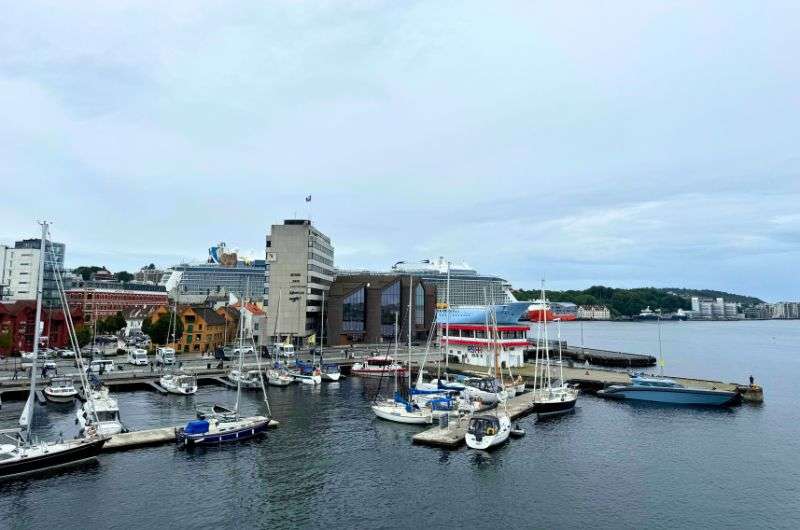
The Petroleum Museum in Stavanger
- Best things to do: Visit the Norwegian Petroleum Museum, walk through the Old Town, spot street art
- Further reading: Top 10 things to do in Stavanger
From the second city to the third, I also rate Stavanger as one of the best places to visit in Norway. Stavanger is basically Norway’s cover model: cute, pretty, and really cool. It’s also Norway’s unapologetic oil hub; how the crude oil industry has transformed their city is a serious source of pride for the locals.
Obligatory oil tip: Do NOT miss the Norwegian Petroleum Museum right by the harbor. This quirky spot is my favorite museum in the entire of Norway!
Once a Viking power center, Stavanger is now home to about 350,000 people. 22% of its residents are immigrants, drawn by jobs with oil. I also found it wild to see massive cruise ships dock in the Old Town, unleashing hordes of tourists that inevitably balloon the population density.
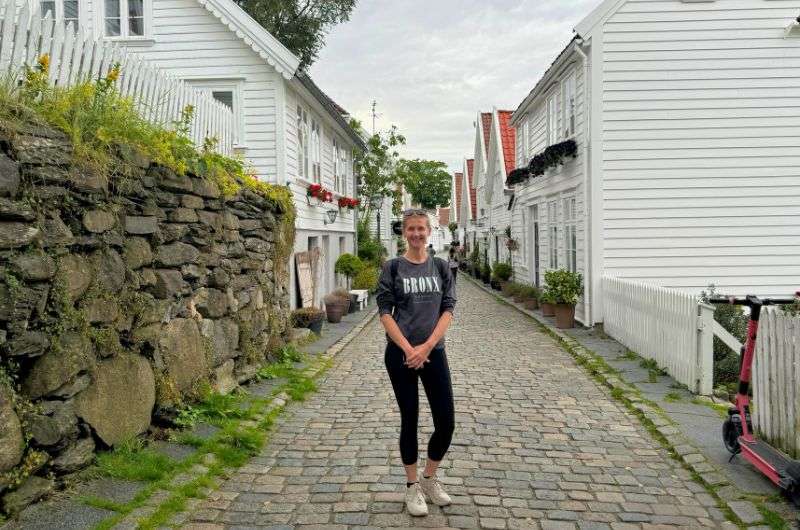
The cute white houses in Gamle Stavanger
The city center is pure Scandinavian postcard material: colorful, picturesque houses and an overall chill vibe. It’s actually a popular spot for people to relax, especially on a hot Norwegian summer day, which could be a breaking news-worthy 25°C (77°F). Meanwhile, the Old Town is all about cute white houses and Instagram-worthy streets—definitely worth checking out.
15. Ålesund—an Art Nouveau toy-town
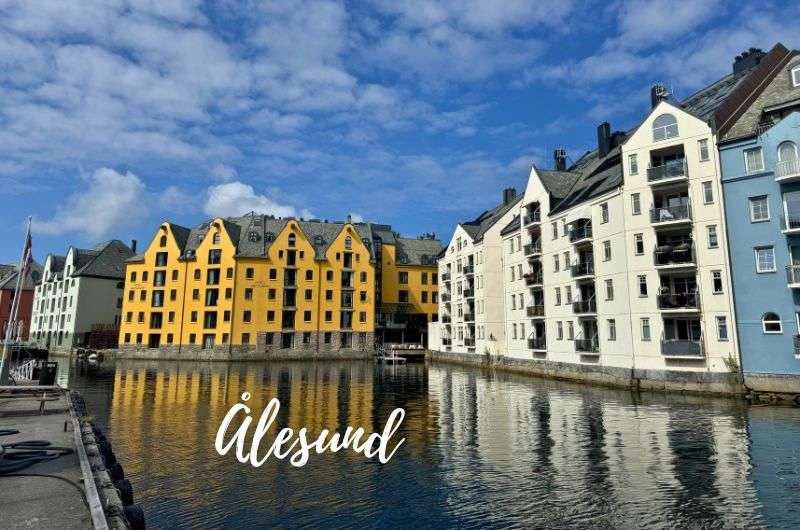
Ålesund
- Best things to do: Hike to Byrampen Viewpoint, visit Alnes lighthouse, see the Tueneset Coastal Battery
- Hotel tips: Hotel Brosundet (for luxury)
Visiting Norway’s 13th-largest city is like stepping into an Art Nouveau fever dream, and even though Art Nouveau isn’t my favorite style, I mean this in the best possible way(!). Rebuilt in the early 1900s after a massive fire, this town in Western Norway decided to glow up with intricately detailed, pastel-colored buildings. If you love over-decoration in architecture, Ålesund is your must-see place in Norway.
Fun fact: Ålesund is built on seven islands connected by bridges and tunnels. This definitely gives the place a unique, Venice-meets-Vikings vibe, and this is precisely what I loved about it.
I know I go on and on about hiking (and FYI, I’m not going to stop), but the wild and windswept feel to Ålesund lends itself to some great urban-ish walking experiences. Even if just to Byrampen Viewpoint, somehow the city looks even more amazing from above.
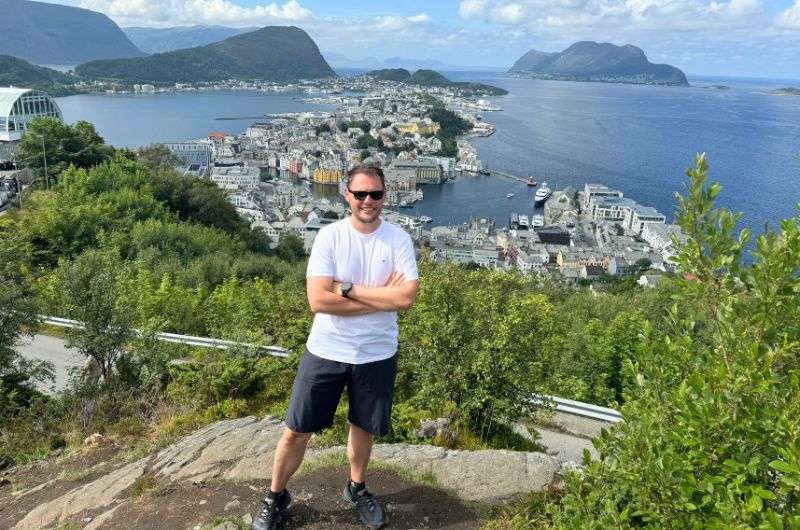
Even in the city, I look for the best walking experiences
And down below, there are plenty of interesting museums to keep anyone entertained, even if you’re just a big kid who can’t resist an aquarium! Check out my article on things to do in Ålesund for more information on this.
16. North Cape (Nordkapp)—best for the midnight sun
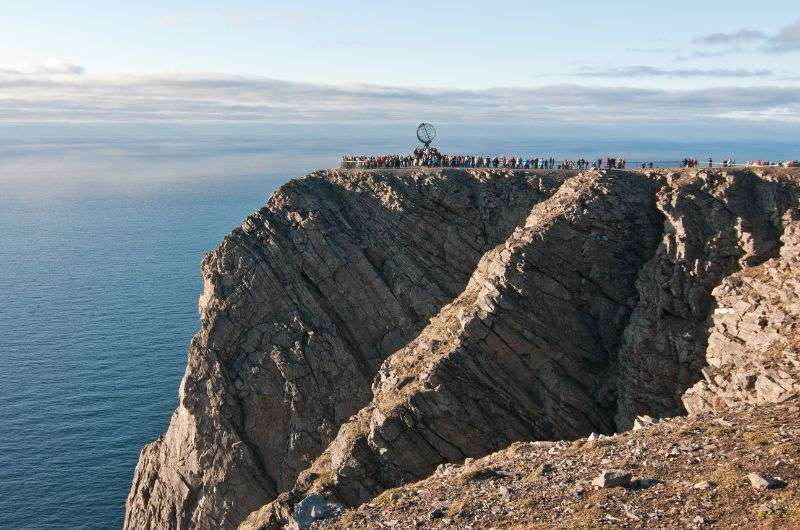
Nordkapp
- Best things to do: Experience the midnight sun, take a photo in front of the global monument
- Further reading: The 15 best things to do in Norway
North Cape, or Nordkapp, is a cape... in Northern Norway. I know—it’s exactly the insightful wisdom like this that keeps you coming back to my blog!
But why should anyone travel to this windswept cliff that looms 307 m (1,007 ft) over the Arctic Ocean? It's a proper Arctic adventure, featuring stark tundra and reindeer crossings, where the daylight never does what you expect it to. And you’d come away with “I’ve been further north than you” bragging rights—a great nerdy bonus.
Fun fact: Despite popular belief, the North Cape isn’t actually mainland Europe’s northernmost point. But it’s managed to get all the attention for it, so I’ll stop the mansplaining right here.
After your long journey to the 71st parallel, look out for the massive globe monument to mark the very spot, and make sure you get a photo in front of it to prove how far you’ve come. But the best thing that North Cape has to offer is the midnight sun, hands down. Who’d have thought that messing with your circadian rhythm could be so much fun?
One last tip: Don’t visit the North Cape in winter. It’s not fun.
17. Oslo—the capital that deserves more love
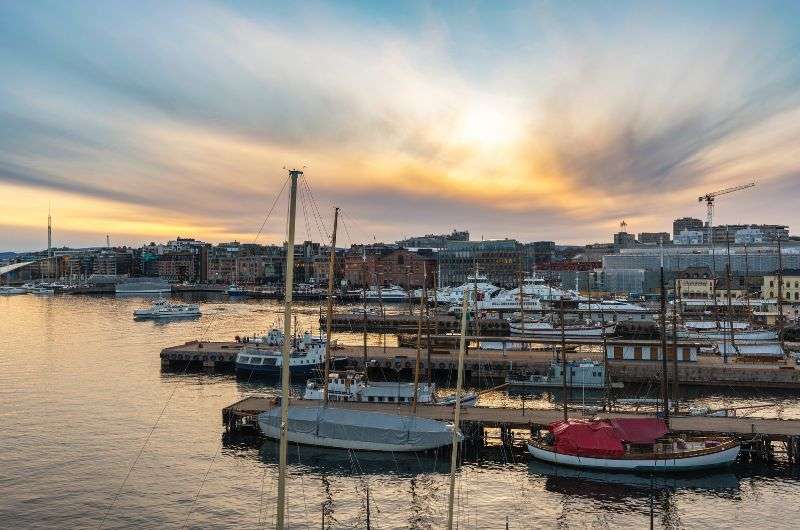
And last but not least: the capital of Norway, Oslo
- Best things to do: Climb on the Opera House, visit the Norwegian Museum of Cultural History, explore Hovedøya island
- Further reading: My 7-day Norway mini-itinerary
What’s Norway best known for? Fjords, mountains, the northern lights, and maybe a dash of crude oil. The sad fact is, Norway’s capital Oslo (population: 709,000) doesn’t always get the love it deserves, and I think this is a mistake. Oslo is nothing like the rest of the country, and yet it’s absolutely one of the best places to visit in Norway!
First off, it’s ridiculously livable. Imagine a city where you can hit a museum in the morning, kayak or cruise on the fjord in the afternoon, and sip craft beer in a trendy bar at night. It’s small enough to feel chill, but big enough to keep you entertained for a few days at least.
The architecture is bold (hey there, Oslo Opera House), the food scene is buzzing—fine dining is second to none—and the green spaces are sprawling. Plus, there are Viking museums (for me) and world-renowned art, all within walking distance. Any Edvard Munch fans, Oslo is your chance to see The Scream in person.
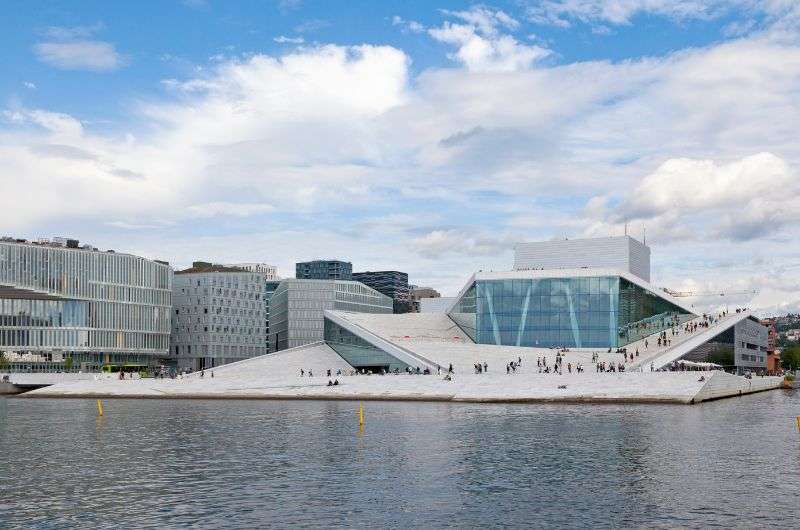
Oslo Opera House
Bluntly put, Oslo is where Norway shows off its modern, urban side without losing its natural edge. Nowhere else could I have climbed a sloping roof, wandered through a medieval fortress, and still felt like I was at the gateway to fjord country.
What is the most beautiful part of Norway?
The most beautiful part of Norway is difficult to pinpoint, but the famous fjords are unique and truly breathtaking. Geirangerfjord and Nærøyfjord are the two Norwegian fjords that make up a UNESCO World Heritage Site, earning the status with their towering cliffs, cascading waterfalls, and emerald waters. Visitors experience them by going on cruises, kayaking, or hiking the surrounding trails.
What is the number one tourist attraction in Norway?
The number one tourist attraction in Norway is arguably the fjords, with Geirangerfjord and Nærøyfjord being the most popular. The fjords showcase the best of Norway's natural landscapes, making them a must-see for travelers. The other main attraction for visitors to Norway is the chance to see the northern lights. You can find out more about the best time and places to catch the aurora in my dedicated article on the best time to visit Norway.
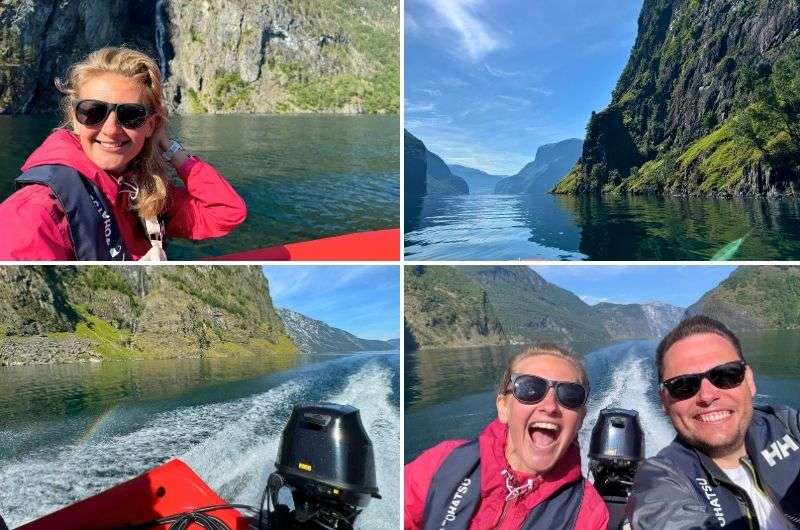
For the best fjord experience, rent a motorboat!
What is the nicest town in Norway?
I consider Bergen to be the nicest town in Norway, thanks to its charming mix of colorful architecture, rich history, and stunning natural surroundings. Aside from Bergen, in my experience, other cities like Stavanger, Ålesund, and Oslo also have their own special appeals.
This post contains affiliate links. I earn a small commission if you make bookings through my links, at no additional cost to you. Thank you for your support!




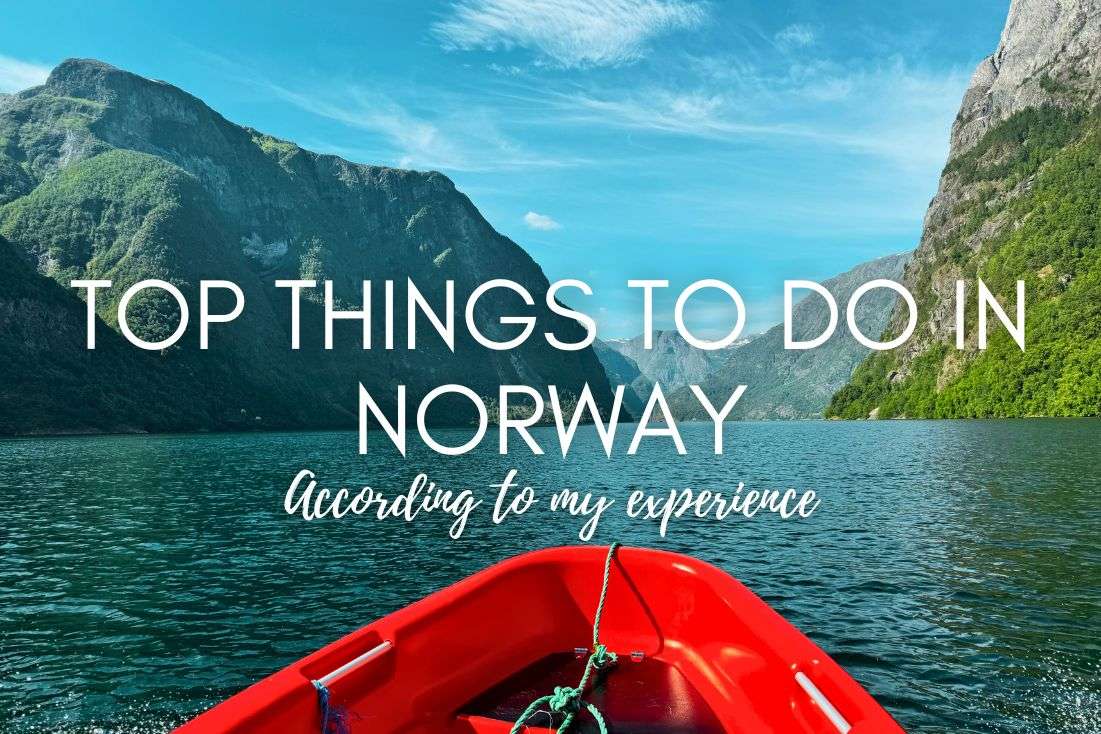
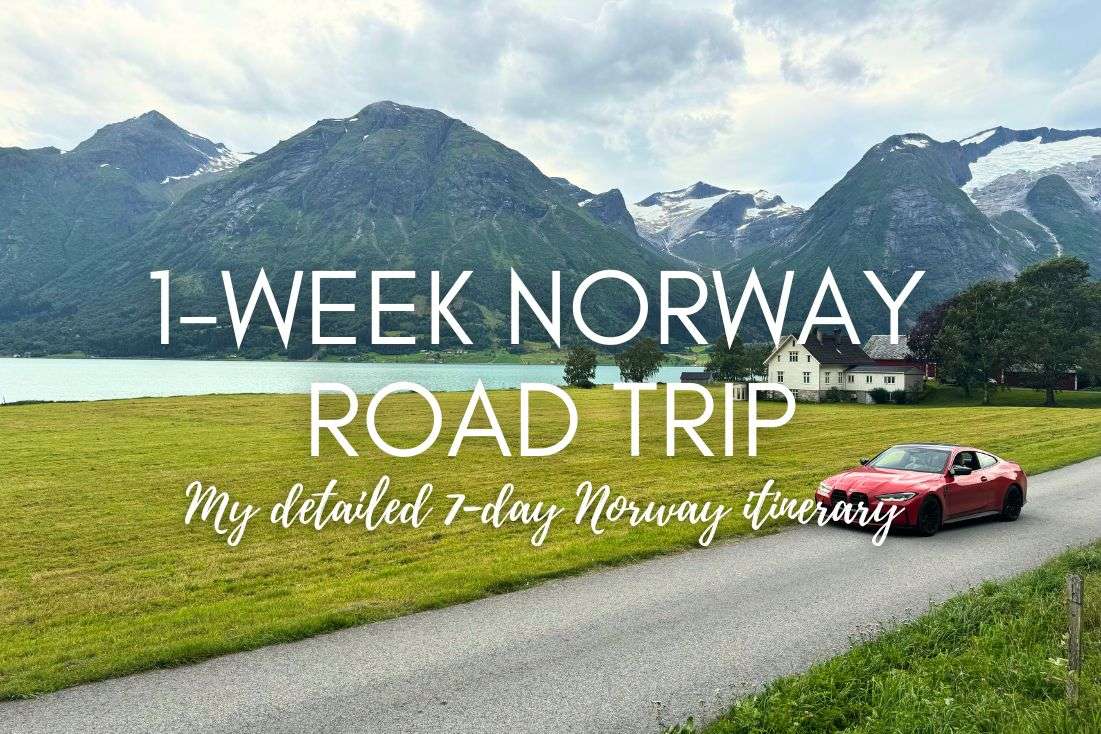
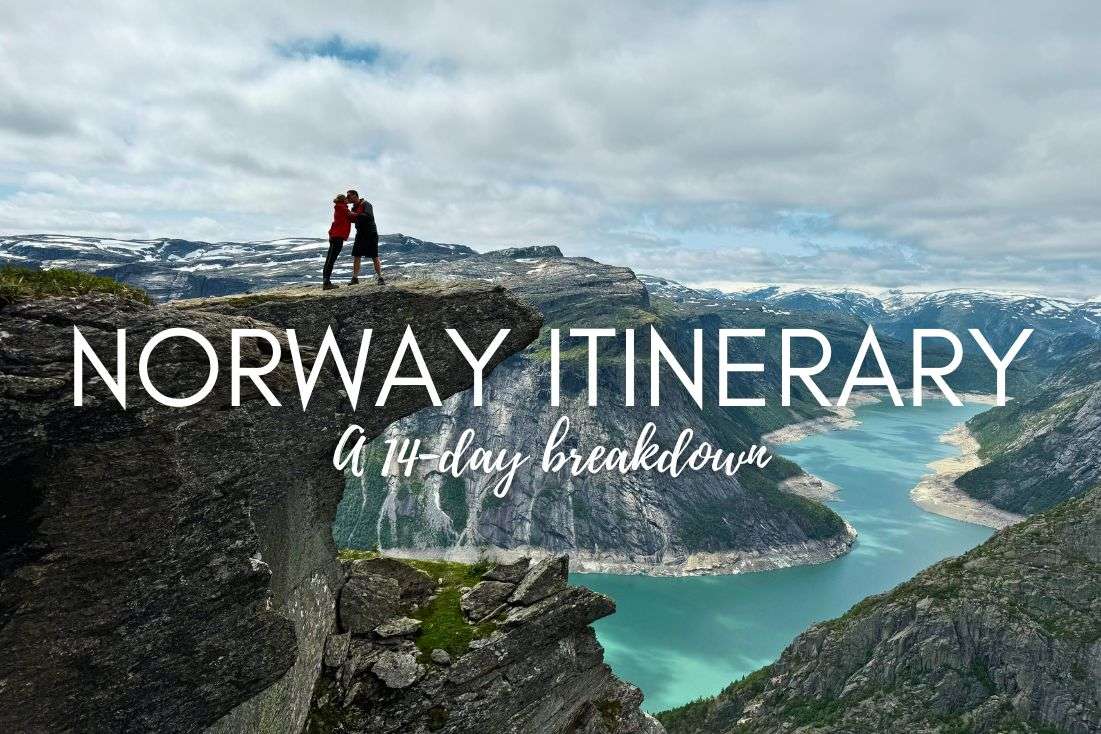



Comments | Thoughts? Give us a shout!